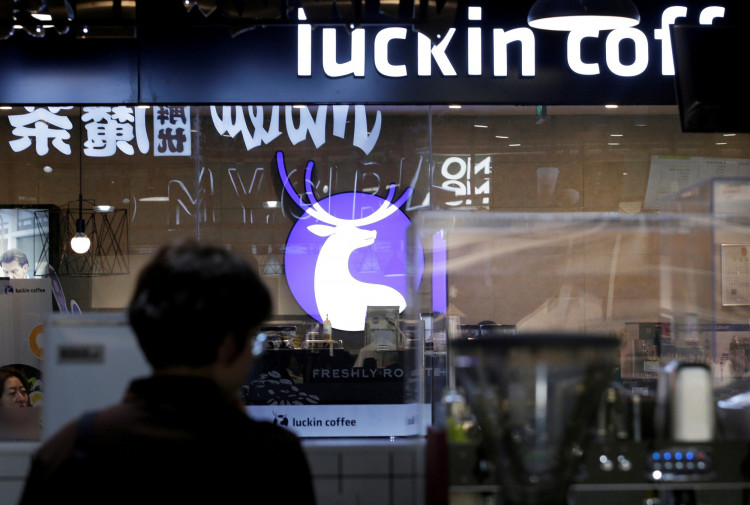Lu Zhengyao Survives Vote To Remain Chairman Of Fraud-Stricken Luckin
Luckin Coffee, after withdrawing its request for a Nasdaq hearing over its delisting last week, voted on Thursday for Lu Zhengyao to continue as the chairman of the board, after a special committee of the board did not get enough votes to replace him.
The company reported the result of the board meeting to the US Securities and Exchange Commission (SEC). Less than two-thirds of meeting attendees voted for Lu's recall from Luckin's board, according to the report, marking a first-round victory for Lu in taming internal strife at the company. Company shares have been suspended from trading on the Nasdaq since June 29.
In early April, Luckin admitted to financial fraud, acknowledging RMB2.2 billion yuan (US$310 million) in fabricated transactions. Luckin claimed its internal investigation into accounting fabrication was nearly complete. It concluded that inflated sales reports associated with falsified transactions started in April 2019, according to the special committee of the board.
Over 4,000 Luckin Coffee stores across China remain in operation.
Former Faraday Future CEO To Compensate Leshi Shareholders
The ex-CEO of Faraday Future (FF) and founder of Leshi Holding Group, Jia Yueting, posted a letter on China's Weibo social media platform that he would reserve up to 10% of a creditor trust to compensate Chinese shareholders of Leshi.
Jia announced that as part of his personal bankruptcy restructuring plan the creditor trust would also be included in the official process after he transferred all his FF equity to the trust.
Jia filed for bankruptcy last October, with a personal debt of over US$3.6 billion. The bankruptcy plan was approved on May 21 by a district court in California, where Faraday Future is based.
Jia, who has been involved in several financial controversies related to his companies, also apologized for Leshi's business collapse, for which he admitted responsibility. Therefore he pledged an amount of not more than 10% of the creditor trust to Chinese shareholders. Leshi is based in Beijing.
Following his announcement, Leshi shares reached a trading volume of RMB138 million ($US19.5 million dollars) on Thursday after 18 months of restricted trading.
Intel Resumes Supplies To Server Giant Inspur
Shanghai-based and Shenzhen-listed information technology company Inspur Information said the US chip giant Intel Corp. had resumed component shipments to the company. Earlier this week, Intel suspended supplies to Inspur, in compliance with a list released by the US Department of Defense which restricted business with 20 companies owned or controlled by the Chinese military.
Affected by the suspension, Inspur Information shares on July 1 declined by 4.75% and Inspur Software shares declined by 0.59%. Intel is Inspur's largest supplier of chips and, over the last three years, Inspur has increased the purchasing volume from Intel.
According to Intel's annual financial disclosure, Inspur spent 17.89 billion yuan ($2.53 billion) purchasing components from Intel in 2019, accounting for 37.53% of all of the purchases among vendors.
More Housing Regulations Rolled Out
Facing the economic effects of the COVID-19 pandemic, a total of 304 housing regulation policies were rolled out in 125 cities across China during the period of January through June in an effort to stabilize the property market – an unprecedented record of regulatory intervention in the housing market, according to the Centaline Property Research Center.
China's property market hit a downturn but has seen a slow recovery since the Chinese New Year in January. According to China's National Statistic Bureau, commercial housing sales totaled 487.03 million square meters from the January to May period, a decline of 12.3% year-on-year.
The bulk of the new regulations focus on providing preferential treatment to skilled workers and talented professionals, Centaline said. During the May and June period, the rate of new housing regulations enacted slowed to 66, compared with the 238 new polices during January-to-April period.
Beijing To Register Cold Food Storage Companies To Combat COVID-19
In the face of the latest COVID-19 outbreak in Beijing, which arose from frozen food in the Xinfadi Wholesale market, city authorities are taking steps to tighten supervision over the cold-food sector. The move comes after the Chinese Center for Disease Control and Prevention reported that the virus can survive freezing temperature for two to three months.
Beijing authorities are now soliciting opinions from the public regarding a new filing regulation for providers of refrigerated and frozen foods. The regulation, proposed by the Beijing Market Supervision and Regulation Bureau, says businesses should register online within 30 days after receiving their business license.
The result of each filing would then be unveiled to the public within five days.





